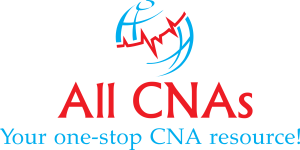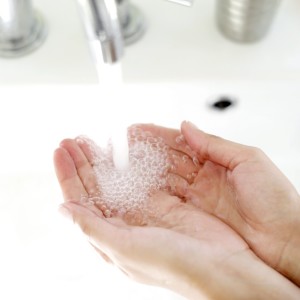Infection Control 101
When do I wash my hands?
A common error that new CNAs make is contaminating their hands after washing. We all know that the sink faucet is dirty and we need a paper towel to turn it off to keep our hands clean…but then we do crazy things like elevating the head of the bed or closing the privacy curtain. Let me help take the mystery out of environmental contamination for you!
Learning to differentiate between clean and dirty items takes a bit of work and practice. But let’s start with the basics. Many items in the patient’s environment are not considered clean and should not be touched with clean hands. Things like the call light, privacy curtain and bed controls are all considered unclean. To prevent accidental contamination, there is a certain order you should perform tasks, designed to keep your hands clean for your patients! Let’s look at some specifics…
The opening: When performing the opening (“Hi Mr. Jones, my name is Patti, and I will be your CNA today. I would like to brush your teeth. Is that okay?”), after obtaining consent, you will tell your patient that you are leaving briefly to wash your hands and gather your supplies. It is at this point that you should close the privacy curtain, BEFORE you wash your hands. Why? Because the curtain is not washed often (usually about once per year) and has probably been handled by uneducated CNAs, patients and their family and friends. They will have an enough bacteria and body substances on them to make a microbiologist squeal with joy.
Like what? I am glad you asked! Patients that have wiped their nose and coughed into their hands will open the curtain to go to the bathroom…and then close the curtain on their way back to bed without washing their hands (Yuck!). CNAs will open a curtain with dirty gloves without thinking about it. Friends and families open and close the curtain all the time…and who knows what is on their hands! At any given time, curtains can harbor traces of saliva, mucous, sputum, emesis, blood, wound drainage, urine or fecal matter (and that’s just for starters). Just because you can’t see it, doesn’t mean it isn’t there! Now, do YOU want your CNA to close that curtain and then put those gloves into your mouth to brush your teeth? Didn’t think so!
So, how do we get around this? Anytime you touch a privacy curtain to open or close it, the very next action you should take is to wash your hands. Make this a habit. The two actions go together. Touch the curtain…clean your hands! So at the beginning of the skill, you should close the curtain for privacy and then wash your hands. At the end of the skill, you should open the curtain to prevent isolation and wash your hands. See? They go together!
The bed controls are not clean either. Patients in bed will use the bed controls to go up and down, up and down. Hey, if you were being billed $300 per day, you would take advantage of the free carnival ride too! If you need to elevate the head of the bed to perform a skill, you should do so during the opening, before you wash your hands. This allows your clean hands to gather clean supplies. This keeps your hands clean for the patient!
Now, let’s talk about the call light. Patients in bed will scratch whatever itches…and then use the call light to tell you all about it! Call light devices are not clean. You should hand the patient their call light at the end of the skill, after opening the curtain, before washing your hands. Do not handle the call light with your dirty gloves at the end of the skill. It will contaminate the call light with really icky germs – not a good idea! Don’t worry about your own bare hands touching the curtain and call light…you are about to wash all those germs right down the drain! As long as your skin is intact (no cuts, sores or openings) and you don’t touch any of your own body openings (eyes, nose, mouth, genitals) before you wash up, the germs can’t get in!
It is important to wash your hands before and after each patient encounter to prevent disease transmission during the skill performance. Understanding what is clean and dirty in the environment is an important step in learning how to keep your patient safe…from you!
(322)

